Politics
hotel mess in Brazil ahead of UN meet
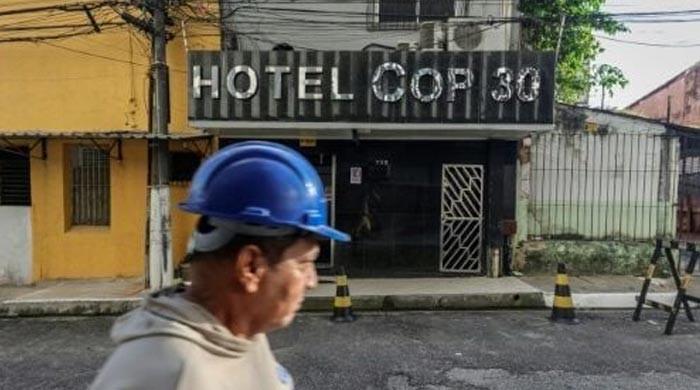
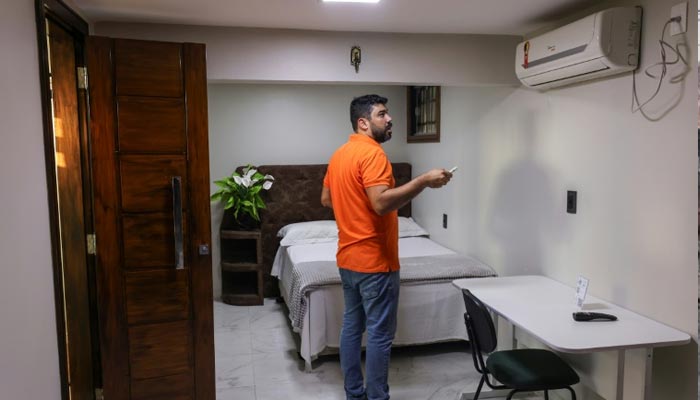
With two months to go, the “COP30 Hotel,” spruced up and renamed after the UN climate conference due to take place in the Amazonian city of Belem in November, has zero bookings.
The owners had been hoping to cash in on the conference by filling all the rooms with foreign delegates.
But the hotel’s eye-watering initial rates — a cool $1,200 per night, which it later lowered to try to drum up business — were a turnoff.
Delegations from governments, NGOs and civil society have repeatedly urged Brazil to put a limit on accommodation costs that have soared for the first-ever climate COP (Conference of the Parties) to be held in the Amazon.
It is a symbolic setting given the rainforest’s critical role in absorbing planet-warming carbon dioxide, but also a challenging one.
More than half of Belem’s 1.4 million residents live in shantytowns — the highest rate of any regional capital in Brazil.
And with a shortage of traditional hotel rooms, conference organizers have scrambled to find alternative accommodation in private homes, universities and schools, and even two cruise ships docked in the harbor some 20 kilometres (12 miles) from the conference center.
As many as 50,000 people were expected to attend COP30, though organizers say only 68 of the 198 participating countries have secured their reservations.
“This has never happened at a COP. Normally, everyone has their accommodation sorted three months in advance,” Marcio Astrini of the NGO Climate Observatory told AFP.
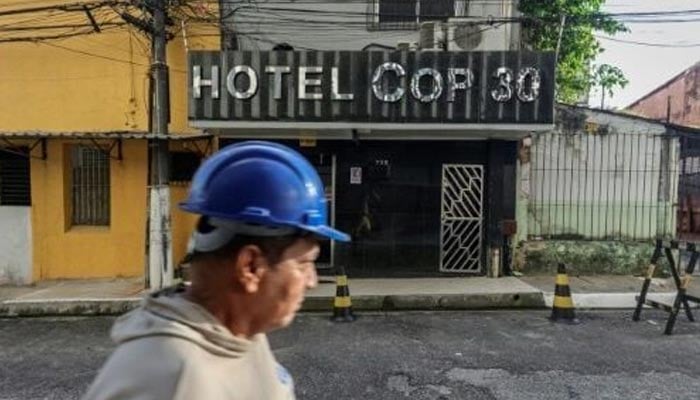
Brazil’s President Luiz Inacio Lula da Silva has batted away concerns, saying in February that delegates can “sleep under the stars.”
Most exclusive COP?
A free-for-all ensued as Belem residents seek to profit from the one-off event that saw an investment of some $700 million in public infrastructure, including a convention centre.
“Prices spiralled out of control,” conceded COP30 Hotel manager Alcides Moura, adding that “Belem never hosted an event of this magnitude.”
Ronaldo Franca, a 65-year-old pensioner, is one of several property owners hoping to make a quick buck by renting out his weekend house, some 25 kilometres (15.5 miles) from the conference venue.
For a property with three double bedrooms and a swimming pool, he is charging $370 per night.
“I’m not going to charge an exorbitant rent, but the government hasn’t sufficiently monitored prices, and some have skyrocketed,” he told AFP.
Organisers say 60% of delegates will rent rooms from Belem residents.
Hotels “are almost all full,” said Toni Santiago, president of the hotel association of Para state. It has rejected a government request to cap prices.
“No one does this for other major global events, so why should Belem?” asked Santiago.
The government has set up a task force to help delegates find rooms, and Para governor Helder Barbalho told AFP “the availability of beds is guaranteed.”
Airbnb, for its part, said the average price for accommodation has dropped by 22% since February.
However, an online search yielded few options for under $100 a night — the limit requested by the UN for delegates from poor countries.
Astrini told AFP that accommodation concerns were overshadowing “what is truly important, like emission reduction goals or climate financing” — issues on the agenda for COP30.
This COP, added the Climate Observatory, could turn out to be “the most exclusive in history.”
Politics
UAE targets online predators and data misuse with child digital safety law


DUBAI: The United Arab Emirates (UAE) has introduced a new federal law aimed at protecting children from online predators, data misuse and harmful digital practices, signalling a tougher global approach to child safety in the digital age.
The legislation seeks to prevent strangers from anywhere in the world from accessing, tracking or interacting with children online, particularly through the collection and use of personal data such as a child’s interests, online behaviour and abilities.
Under the decree-law, digital platforms are prohibited from collecting, processing or sharing the personal data of children under the age of 13, except in limited cases such as educational or health-related services. Children are also barred from creating accounts or accessing online games and digital activities that involve gambling or betting with money.
The law applies to digital platforms and internet service providers operating in the UAE or targeting users in the country, including social media, messaging apps, online gaming platforms, streaming services, search engines and e-commerce websites.
It requires platforms to introduce default privacy settings, age-verification systems, content filtering and age-rating tools, while internet service providers must activate content controls and ensure parental consent for children’s internet use.
A Child Digital Safety Council, chaired by the Minister of Family, has been established to coordinate policy, legislation and awareness campaigns on emerging digital risks.
The decree forms part of the UAE’s broader social policy agenda, following the country’s declaration of 2026 as the Year of the Family, reflecting a wider push to strengthen family and child protection frameworks in an increasingly digital world.
Politics
Zelenskiy to hold high-stakes talks on land, security with Trump on Sunday
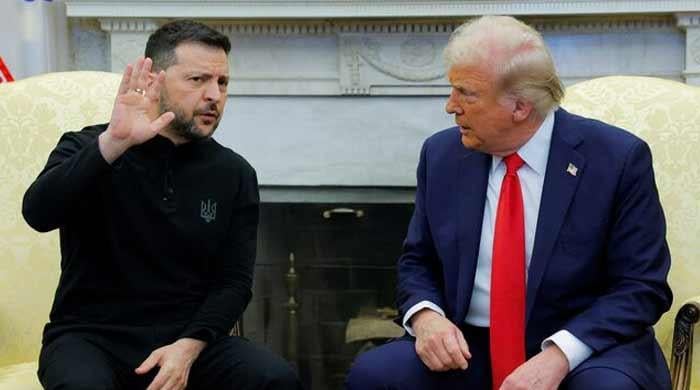
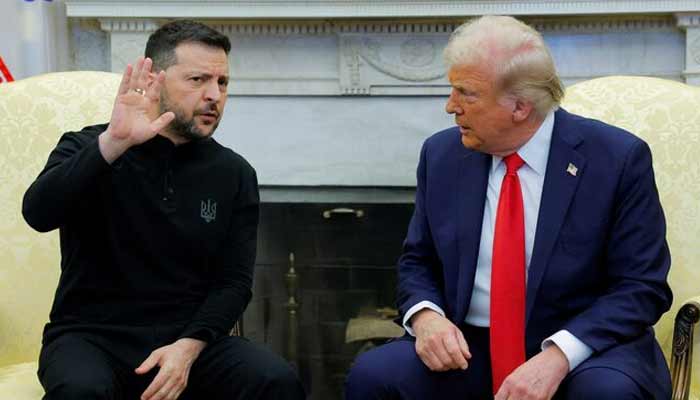
- Ukraine seeks deals to prevent any further Russian aggression.
- Peace deal, security guarantees draft “almost” at 90%: Zelenskiy.
- Zelenskiy hints raising territorial, nuclear plants issues during meeting.
Ukrainian President Volodymyr Zelenskiy will discuss territorial issues, the main stumbling block in talks to end the war, with US President Donald Trump in Florida on Sunday, as a 20-point peace framework and a security guarantees deal near completion.
Announcing the meeting, Zelenskiy said that “a lot can be decided before the New Year,” as Washington continues to drive efforts to end Russia’s full-scale war in Ukraine, Europe’s deadliest conflict since World War Two.
“As for the sensitive issues: we will discuss both Donbas and the Zaporizhzhia nuclear power plant. We will certainly discuss other issues as well,” he told reporters in a WhatsApp chat.
Russia wants Ukraine to withdraw from the parts of the eastern Donetsk region that its troops have failed to occupy during almost four years of war, as it seeks full control of the Donbas, comprising the Donetsk and Luhansk regions. Kyiv wants fighting to be halted at current battle lines.
The US, seeking a compromise, proposed a free economic zone if Ukraine leaves the area. It remained unclear how that zone would function in practical terms.
Territorial issues remain a hurdle to negotiations moving forward. Any compromises on territory should be decided by the Ukrainian people in a potential referendum, Zelenskiy said.
The Zaporizhzhia nuclear power plant, Europe’s biggest, is located on the front line and controlled by Russian forces.
Leaders to refine details in US meeting
Zelenskiy added his meeting with Trump aimed to “refine things” in the drafts and discuss potential deals on Ukraine’s economy.
He said he was not ready to say if any deal would be signed during his visit, but Ukraine was open to it.
A security guarantees agreement between Ukraine and the US was “almost ready” and the 20-point plan draft was at 90% completion, Zelenskiy added.
Wary of failed guarantees from allies in the past, Ukraine is seeking robust and legally-binding deals to prevent any further Russian aggression.
The White House did not immediately respond to a request for comment.
Trump, who has at times expressed frustration with the slow pace of progress in the negotiations, previously suggested that he would meet with Zelenskiy if he felt that a major diplomatic advance was possible.
European leaders might join the talks online, according to Zelenskiy. On Friday, he discussed “significant progress” in peace efforts with Finland’s President Alexander Stubb.
Russian demands
It was not clear which peace plan proposals Moscow would be willing to accept.
Putin’s foreign policy aide, Yuri Ushakov, spoke with members of the Trump administration after Moscow received US proposals about a possible peace deal, the Kremlin said on Friday.
When asked how Moscow viewed the documents, Kremlin spokesman Dmitry Peskov said he did not want to comment as Russia felt making remarks in public could undermine the negotiations.
Russia’s Kommersant newspaper reported that Putin told some of Russia’s top businessmen that he might be open to swapping some territory controlled by Russian forces elsewhere in Ukraine, but that in exchange he wanted the whole of the Donbas.
Even as the talks proceeded, Russia continued hammering Ukraine’s energy infrastructure and stepped up attacks on the southern region of Odesa, the site of Ukraine’s main seaports. On Friday, a Russian attack on the northeastern city of Kharkiv killed two.
Zelenskiy said he planned to raise the issue of placing additional pressure on Russia with Trump.
Politics
Explosion at Alawite mosque in Syria’s Homs kills six
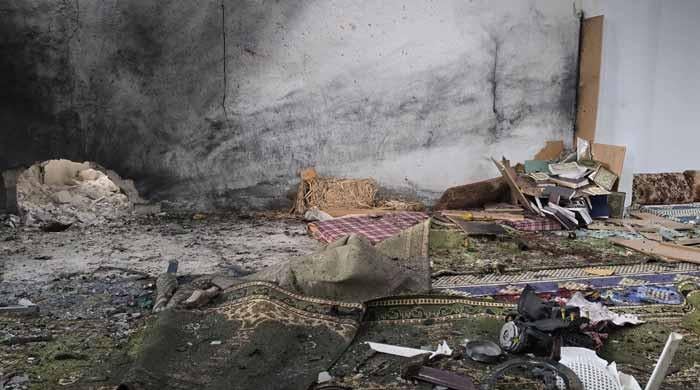
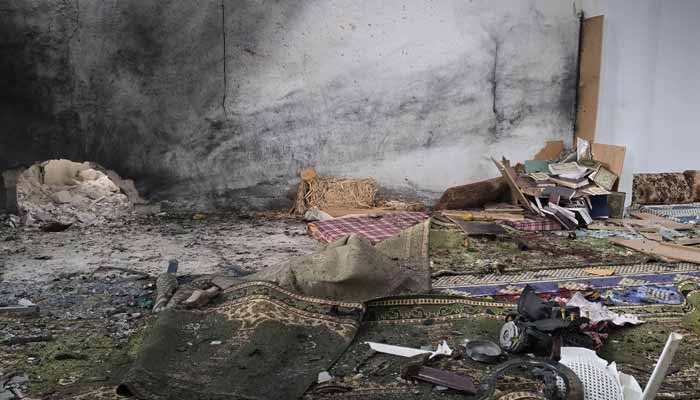
- Syrian interior ministry says 21 others were wounded in explosion
- Local official says blast took place during Friday noon prayers
- Black smoke covered part of mosque, with carpets scattered nearby.
A deadly explosion hit a mosque in a predominantly Alawite area of Syria’s Homs on Friday, said authorities who reported at least six people killed.
“A terrorist explosion targeted the Ali Bin Abi Talib Mosque during Friday prayers in Al-Khadri Street in the Wadi al-Dahab neighbourhood of Homs,” the interior ministry said in a statement, adding that six people were killed and 21 others wounded.
Homs was the scene of heavy sectarian violence during Syria’s civil war.
Syria’s state news agency Sana, which also reported the blast, said its cause and nature were being investigated.
According to the Britain-based Syrian Observatory for Human Rights monitor, it was not immediately clear whether the blast “was caused by a suicide attack or an explosive device”.
A local security source in Homs told AFP on condition of anonymity that the explosion may have been caused by “an explosive device placed inside the mosque”.
A resident of the area, requesting anonymity out of fear for his safety, told AFP people “heard a loud explosion, followed by chaos and panic in the neighbourhood”.
“No one dares to leave their house, and we are hearing ambulance sirens,” he added.
Sana published photos from inside the mosque, one of which showed a hole in a wall.
Black smoke covered part of the mosque, with carpets and books scattered nearby.
Since Assad’s ouster in 2024, the Observatory and ordinary Syrians in Homs have reported kidnappings and killings targeting members of the minority community.
Syria’s coastal areas saw the massacre of Alawite civilians in March, with authorities accusing armed Assad supporters of sparking the violence by attacking security forces.
A national commission of inquiry said at least 1,426 members of the minority community were killed at the time, while the Syrian Observatory for Human Rights monitor put the toll at more than 1,700.
-

 Fashion1 week ago
Fashion1 week agoIndonesia’s thrift surge fuels waste and textile industry woes
-

 Business1 week ago
Business1 week agoBP names new boss as current CEO leaves after less than two years
-

 Tech1 week ago
Tech1 week agoT-Mobile Business Internet and Phone Deals
-

 Sports1 week ago
Sports1 week agoPKF summons meeting after Pakistani player represents India in kabaddi tournament
-

 Entertainment1 week ago
Entertainment1 week agoIndia streamlines visa rules in boost for Chinese professionals
-

 Sports1 week ago
Sports1 week agoUWCL grades for all 18 teams: Leuven get A+; Barça an A-, PSG fail
-
Sports6 days ago
Alabama turned Oklahoma’s College Football Playoff dream into a nightmare
-

 Entertainment1 week ago
Entertainment1 week agoRadiation fears rise after cracks found in $2 billion Chernobyl shield





